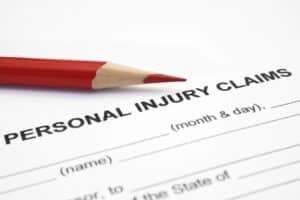What Is a Personal Injury Case?
Home » Personal Injury Resources » What Is a Personal Injury Case?

Let’s say you were injured in a car accident due to the poor driving of another driver. Your personal injury case begins when you seek compensation for your injury in a court of law. This compensation, also known as damages, is for the costs you incurred due to the other driver’s negligence as well as for your pain and suffering. These cases are tort cases, meaning they are civil and not criminal cases.
Negligence means that the person that injured you failed to act with the level of care that someone else in the same situation would have. This is known as the “reasonable person” standard.
Although negligence cases make up the bulk of personal injury claims, cases can also be brought on the basis of:
- Strict liability – Liability exists regardless of intent or negligence. An example would be when an injury occurs due to a faulty product. There, the manufacturer could be held strictly liable even though it was not their intent for the product to cause any injury.
- Intentional Torts – An injury caused by the intentional act of someone else. An example would be the intentional infliction of emotional distress.
Personal injury cases usually involve physical injuries, but they can also include emotional distress as well.
Table of Contents
What Are Common Examples of Personal Injury Cases?
In addition to motor vehicle accidents, other common personal injury cases include:
- Slip and fall accidents
- Accidents at work or construction sites
- Medical malpractice
- Defective product cases
- Dog bites
- Brain injuries
This list is by no means exhaustive. If you or a family member suffered an injury that was caused by someone else, contact a personal injury lawyer to schedule a free consultation.
How Do I Prove a Personal Injury Case in California?
There are four elements needed to establish negligence:
- Duty of care – Did one party owe a responsibility of care to the other party? Think of a dog owner who has a duty to keep a dog leashed and restrained in certain situations.
- Breach of that duty – Was that responsibility or duty breached? As in, did the dog owner take the dog out on a walk without a leash?
- Damages – Was the victim harmed by that breach? Probably so if you jogged by the dog and it lunged at you and bit your leg.
- Causation – Did the person’s acts or omissions cause the injury? In this example, the dog was able to bite your leg because it wasn’t leashed.
Once you have established these elements, you’re well on your way to receiving compensation.
Damages You Can Recover for a Personal Injury Case in California

Part of your personal injury lawsuit will be a request for damages caused by and related to your injuries. Damages are awarded to personal injury victims who succeed at establishing liability. These damages are intended to put you back in the position you were in before the accident (or better in certain cases).
The two primary types of damages are economic damages (e.g., medical expenses, lost wages) and non-economic damages (like pain and suffering).
Economic damages also include:
- Medical treatment
- Repair or replacement of property
- Lost wages and future earnings
- Loss of earning capacity
Non-economic damages also include:
- Loss of consortium
- Loss of enjoyment of life
- Inconvenience from the accident
- Emotional distress
California also allows for punitive damages in cases where the at-fault party’s behavior was particularly egregious. To get punitive damages in California, you must prove that the at-fault party also showed malice, oppression, or fraud in their actions. These damages are rarely awarded.
Limits on Damages in California
There are some limits on the amount of damages you can receive in personal injury cases.
If you’re an uninsured driver, you are not entitled to non-economic pain and suffering damages. This would be the case even if you weren’t at fault.
The exception to this rule is if the uninsured driver is in an accident with a driver who is driving while drunk or on drugs and is convicted of a DUI as a result of the accident. California also limits noneconomic damages in medical malpractice cases to $250,000.
Filing Deadlines for Personal Injury Cases in California
The amount of time you have to file a suit in court for your personal injury case differs from state to state. It also depends on the nature of your personal injury case. This set amount of time is called the statute of limitations.
California law says that once you have been injured, you have two years from the date of the injury to file a lawsuit against those who might be at fault. If you miss the statute of limitations deadline, a court will not hear your case.
Some special circumstances can affect the statute of limitations. For instance, if the injury isn’t apparent right away, the injured party has one year from discovering the injury to file a lawsuit. In personal injury suits against the government, you have six months to file your claim.
Comparative Fault – Share the Blame
In California, if the person filing the personal injury claim had any responsibility for their injury, the amount of the damage award will be reduced based on the percentage of fault. This is called comparative fault.
So if an accident was 20% your fault, whatever damages you receive will be reduced by 20%.
Won’t My Insurance Company Take Care of Me?
In a perfect world that would be the case, but insurance companies are businesses. The less they pay out to you, the better it is for their profit margin. Beware of an offer that is too low to get you to settle the claim. Once settled, you can’t go back and ask for more later.
If you’re not satisfied with what the insurance company is offering, you can attempt to negotiate for more, or you can file a lawsuit.
Schedule A Free Consultation With a Personal Injury Lawyer
Being injured in an accident can turn your world and your family’s world upside down. You are trying to recover from the accident while also taking care of the endless details involved.
Contact a personal injury attorney for a free consultation. They will assess your case and help you plan the best path forward to get the compensation you deserve.
